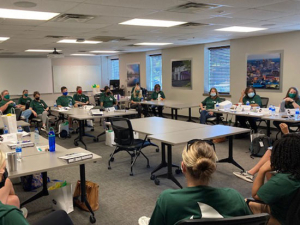The 2010 Faculty and Staff Climate Survey was the first of its kind at UAB. It gave employees an opportunity to give constructive feedback on issues of concern to them.
 |
| Carrie McGlone, Payroll/LD administrative system instructor, explains reports available on Oracle during a recent training session for Financial Affairs employees. |
Numerous organizations across campus have implemented changes as a result of the survey, including Human Resources, whose efforts were featured in the Aug. 8 issue of the UAB Reporter.
Another group that has made a concerted effort to facilitate change is Financial Affairs. The division has implemented recurring training classes, changed the organizational structure of the group and developed a new employer evaluation form, among other notable changes, says Tim McMinn, executive director of Budget and Payroll.
“We thought it was important for us as an organization to set reasonable goals for change for our employees, and we wanted to make sure that these goals became part of our culture,” McMinn says. “We didn’t want just one big bang and then it’s gone. We’ve started these training classes, and they are there to stay. We’ve gone through the performance evaluations, completed them this summer, and we’ve made a commitment to the staff that we will do them again next March.
“We really wanted to set reasonable goals and make sure we live up to them so the staff will see that we are listening to them and making changes,” McMinn says.
Promotions, evaluations, training, building safety and parking were the subjects most identified as areas of focus by Financial Affairs staff in the survey. Focus group meetings were held in the division to discuss the results of the survey in the spring, and summer meetings between Associate Vice President for Financial Affairs Patricia Raczynski and Financial Affairs directors and Human Resources department representatives led to action plan development.
Raczynski assured her division it would focus on the topics of promotion, evaluation and training — items she knew could be immediately impacted — and that she would continue to champion any positive changes regarding building safety and parking with UAB senior management.
Focus group summaries showed promotions covered a wide range of topics, including organizational structure, job requirements and the recruitment process. These issues are addressed frequently in what Raczynski refers to as infomercials — or five- to seven-minute presentations on a particular topic prior to the monthly training classes.
“The information our employees needed was available,” Raczynski says. “We just needed to develop a process to relay the information.”
The first infomercial focused on training and educating staff. It concentrated on promotions and how an employee can enhance his or her ability to move up within the job structure of Financial Affairs. A second infomercial showed employees how to read the organizational chart and target areas of interest for advancement.
“They were honest discussions with the staff about the things they need to do so we can help them reach their goals,” McMinn says. “We showed them how to find the minimum qualifications for jobs, how to go to Human Resources and see the grade ranges for jobs. It’s a way to try to help our employees better understand the UAB process, which is a vital part for employees of any organization this breadth and size.”
Addressing the job tiers within the division required a more intense action plan. After consulting with Human Relations and Compensation, new financial affairs associate titles were created to replace the previously existing financial assistant and financial associate titles.
The changes also provided a new tier within the structure, meaning the division now has financial affairs associates I, II and III, which provides another promotion track within the division.
Other job titles also were collapsed into the new financial affairs associate titles, including financial aid specialist, acquisition specialist, payroll specialist and office services specialist III. The buyer position also was reclassified.
Positive feedback
The training classes have been taking place for the past eight months. Approximately 17 people attend each one-hour class, taking about six weeks on average to complete a topic. The topics being investigated relate to Financial Affairs and are targeted at giving Financial Affairs staff the ability to better serve the UAB community. Further training on financial topics is encouraged through Training & Development.
The next round of training will focus on Excel, and the current infomercial is on the net pay calculator located on the payroll website at financialaffairs.uab.edu.
“The infomercials really relate to you as an employee,” McMinn says. “The training relates to you as a Financial Affairs representative.”
The changes, which have affected more than 170 employees, have been well received. Directors have visited the training sessions and introduced themselves, and employees have networked with one another to learn more about other positions within the division and how they operate.
“The feedback has been positive,” McMinn says. “You’ve definitely seen more interaction among staff and between the management and the staff. There has been more conversation. Maybe an employee doesn’t wait until they get frustrated to go to a manager. It’s opened a dialogue, and I think our employees now feel more informed of the role of Financial Affairs for the university and not just what their unit does. They see the overall big scope and purpose of the office.”







































